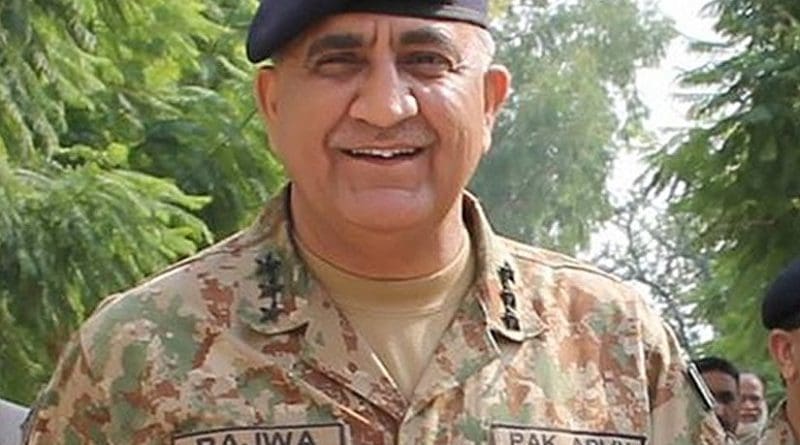Will Gen Bajwa’s ‘Non-Interference In Politics’ Commitment Endure? – OpEd
In what could well be his last public address, Pakistan army’s outgoing army chief Gen Qamar Javed Bajwa did the unexpected. Not only did he accept that “our army … is often made the subject of criticism,” but also opined that “a major reason for this is the army’s interference in politics for the last 70 years, which is unconstitutional.”
Adding that “This is why in February last year the army, after great deliberation, decided that it would never interfere in any political matter,” Gen Bajwa went on to say, “I assure you we are strictly adamant on this and will remain so.”
The retiring army chief deserves due appreciation for publicly accepting that Pakistan isn’t a country with an army, but an army with a country- a well-known fact which Rawalpindi has hitherto been downplaying. Gen Bajwa is undoubtedly spot-on in concluding that Pakistan army’s ongoing interference in politics is the root cause of public alienation.
However, the very fact that he decided to finally act and supposedly end army interference in politics just nine months before his six-year long tenure was to end, raises serious doubts regarding the sincerity of his claim.
Likewise, the outgoing army chief’s assertion that Rawalpindi was “strictly adamant” to stay away from politics “and will remain so,” doesn’t sound very encouraging as it comes at a time when Gen Bajwa has less than a week left in office. Thus, while the wordings of Gen Bajwa’s assurance are indeed very impressive, unfortunately it’s the timing that raises strong suspicions that this is nothing but an attempt on the outgoing army chief’s part to pass the buck onto his successor.
To compound the confusion, while Gen Bajwa confirmed that Rawalpindi has eschewed politics way back in February this year, yet the “neutral” Gen Bajwa’s address was surprisingly pregnant with political innuendoes. For example, while declaring that “The army has started its catharsis” was fine, where was the need for him to say, “I hope political parties will also reflect on their behaviour”?
Moreover, by talking about “selected” and “imported” governments as well as offering unsolicited advice that “We need to reject this behaviour [as] victory and defeat are part of politics,” Gen Bajwa has displayed a highly politically active mindset! So, it’s but natural that his pledge about the Pakistan army keeping away from politics in future doesn’t seem to inspire much confidence.
Let’s face facts. The Pakistan army has continuously enjoyed absolute authority with zero accountability for over seven decades. Army Generals and not politicians were the ones who plunged Pakistan into war with India- Gen Ayub Khan in 1965, Gen Yahya Khan in 1971 and Gen Pervez Musharraf in 1999. It wasn’t the civilian government but Gen Zia ul Haq who entered into a Faustian deal with the US to train ‘mujahideens’ for fighting the Soviet forces in Afghanistan and thereby turning Pakistan a veritable breeding ground for terrorists.
While the Pakistan army may make tall claims about its successes,it has little to show by way of quantifiable achievements. It failed to annex J&K in 1947, and conveniently conceals the abysmal failure of its second such attempt to do so 1965 [Operation Gibraltar] by making a big show of having defended the nation against Indian’s army’s counter-offensive. In 1971, it lost erstwhile East Pakistan, while its 1999 Kargil intrusion ended in a dismal failure.
Yet no Pakistan army General has ever been taken to task for these humongous acts of gross professional incompetence. Au contraire, civil governments have been toppled by the army at will and elected prime ministers have been sacked and even hanged through undemocratic and illegal ploys orchestrated by Rawalpindi.
Despite the lacklustre performance of military regimes in Pakistan, Rawalpindi still considers itself to be the only organisation that can effectively and efficiently run the country. In fact, this belief is so strong that in 1998, the then Pakistan army chief Gen Jehangir Karamat openly called for re-establishing the National Security Council in order to give the military official representation in the country’s politics.
So strong was his conviction that when this suggestion didn’t find favour with the Nawaz Sharif government, Gen Karamat chose to resign rather than retract his demand!
Besides the delusional belief that only the army can run Pakistan, there are other potentially explosive mundane issues that practically rule out Rawalpindi’s abstinence from politics. Rawalpindi is well aware that by renouncing the extra-constitutional powers that it enjoys, will open a Pandora’s box as people will demand an explanation for a host of its wrongdoings and dubious dealings.
Resultantly, Rawalpindi will have to face tough questions on various issues, like its self-sanctioned land grant scheme to senior army officers and running of commercial enterprises by the armed forces. More pertinently, the army will have to explain its inability in subduing terrorist groups like Tehreek-e-Taliban Pakistan [TTP] and Baloch freedom fighters despite apportioning a major chunk of the national budget.
Hence, it’s highly unlikely that Rawalpindi would give up the seat of power and disassociate itself from politics so easily. That’s why who replaces Gen Bajwa really doesn’t matter to the people of Pakistan in particular and the world in general!

